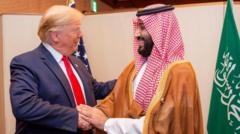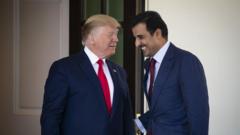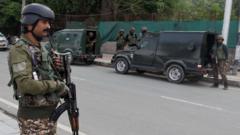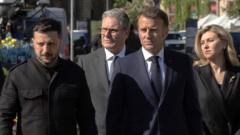As the US ramps up diplomatic pressure on Iran over its nuclear program, both nations appear to remain significantly apart in their negotiating positions. Tensions center on longstanding concerns regarding Iran's potential pursuit of nuclear weapons capabilities, leading to fears of escalating conflict in the Middle East.
US and Iran's Nuclear Negotiations Enter Critical Phase
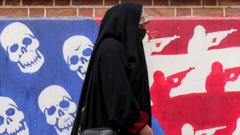
US and Iran's Nuclear Negotiations Enter Critical Phase
Intensifying diplomatic efforts are set as the US and Iran preparation for complex talks on nuclear deal renegotiation.
In recent weeks, US President Donald Trump has pivoted his focus towards Iran, framing the situation as crucial to regional stability. He views the impending discussions as a second chance to address what he sees as unfinished business stemming from his earlier presidency. In 2015, the US and other global powers had agreed upon a groundbreaking deal, the Joint Comprehensive Plan of Action (JCPOA), which aimed to curtail Iran’s nuclear ambitions in exchange for lifting economic sanctions. However, Trump’s withdrawal from the accord in 2018 has instead heightened fears that Iran may accelerate its enrichment of uranium, potentially building a nuclear weapon.
Trump's administration has clarified that the United States now employs a strategy of “maximum pressure” against Iran, recently intensifying sanctions and indicating readiness for military options should talks fail. With Iran's economy in turmoil, some in Tehran appear to favor an agreement to ease sanctions, although hardliners may resist notable concessions—especially the complete cessation of any nuclear enrichment, which remains a central demand from the US.
While negotiations will take place in Oman, divisions remain wide—both in terms of the proposed dismantling of Iran’s nuclear facilities and the cessation of support for regional militias. Israeli officials have reiterated their stance that any deal must entirely remove Iran's nuclear capabilities, emphasizing diplomatic solutions as potentially insufficient should they fail.
All parties are aware that failure to find common ground could lead not only to stalled diplomatic solutions but to militarized conflict in the region, raising the stakes dramatically. With a two-month timeline set for resolving these issues, the outcome remains uncertain as Tehran grapples with internal pressures alongside external diplomatic challenges.
Trump's administration has clarified that the United States now employs a strategy of “maximum pressure” against Iran, recently intensifying sanctions and indicating readiness for military options should talks fail. With Iran's economy in turmoil, some in Tehran appear to favor an agreement to ease sanctions, although hardliners may resist notable concessions—especially the complete cessation of any nuclear enrichment, which remains a central demand from the US.
While negotiations will take place in Oman, divisions remain wide—both in terms of the proposed dismantling of Iran’s nuclear facilities and the cessation of support for regional militias. Israeli officials have reiterated their stance that any deal must entirely remove Iran's nuclear capabilities, emphasizing diplomatic solutions as potentially insufficient should they fail.
All parties are aware that failure to find common ground could lead not only to stalled diplomatic solutions but to militarized conflict in the region, raising the stakes dramatically. With a two-month timeline set for resolving these issues, the outcome remains uncertain as Tehran grapples with internal pressures alongside external diplomatic challenges.

